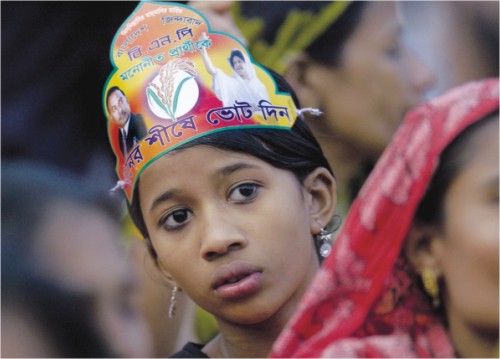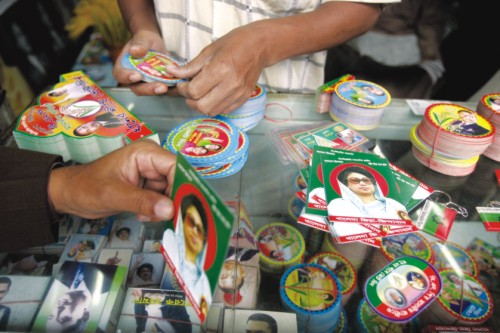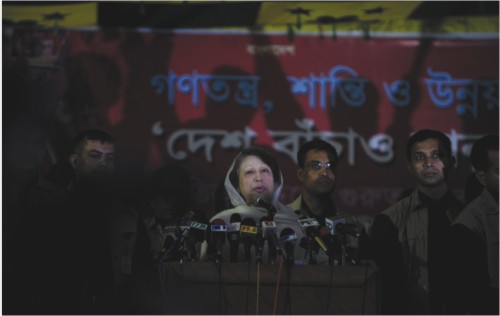
Inside
|
Whither Nationalist Politics? Jyoti Rahman In the election of December 29, 2008, voters unequivocally rejected nationalist politics -- the BNP-led alliance garnered around 37 per cent of the votes cast, against the Grand Alliance's approximately 57 per cent. But what caused the collapse in the nationalist alliance's support? Most post-election analysis of the BNP politics explores this question. Another question speculates on what will the BNP leadership do after this debacle? The focus of this piece is broader than just this election, the recent past, or the near future. The aim is to explore what might happen to nationalist politics -- by which I mean the political coalition put together by Ziaur Rahman in the 1970s, and its successors in the subsequent decades -- over the coming years. This coalition, in various manifestations, has dominated Bangladeshi politics in the past three decades. Regardless of the numbers in the current assembly, this political brand will continue to be an important factor in our politics. But it is not likely that this brand of politics can continue as it stood before the election. Rather, I argue that BNP, or any other party that emerges as the standard bearer of nationalist politics, will need to re-examine the ideological basis of nationalist politics and rehaul the political message if it is to regain its past dominance. The question, then, is what path will the nationalist politics take in terms of ideas? Nationalist politics: A primer Beside his personal popularity, his government received public support for its ability to establish a semblence of social and economic stability and competent governance -- things the nation craved after years of uprisings, war, coups, and assassinations. And Zia, of course, benefited from the strong anti-AL feeling that was prevalent after the Mujib government's poor record in office.
But other than these factors related to Zia the individual or specific to the time, there were a set of ideas that marked Zia's politics apart from those of his predecessor or opponents. Firstly, there was a clear articulation of a sense of national identity that effectively resolved the Bengali Muslim's identity problem. Bengali Muslims, who make up seven out of every eight Bangladeshis, spent the previous century agonising over the supremacy of their language and religion. By emphasising the territory of Bangladesh, and the historical developments leading to the creation of that territory, this identity dilemma was bypassed if not resolved. To be sure, the task of establishing a citizenship notion of Bangladeshi identity -- one that is inclusive of ethnic and religious minorities, and one that is based on the rights and responsibilities of the citizens rather than ethno-religious tribalism -- is still unfinished. But this cannot be done until the majority Bengali Muslims are comfortable in their own skin, and the nationalist politics initiated by Zia achieved exactly that. There were, however, other elements to the sense of identity projected by Zia's politics. Zia's Bangladeshi nationalism was very appealing to a significant section of our population for whom anything Indian is anathema. Many, though not all, Indo-skeptics also subscribe to some variety of Islamist politics. Partly to court their support, and partly because it was never particularly popular (perhaps because the case for it was never clearly argued), Zia also removed secularism from the constitution. Zia re-oriented the nation from the path set by the first post-Liberation government in another important sphere -- the economy. Whereas the Mujib government was, at least in its rhetoric, committed to socialism, Zia specified socialism to mean social justice. However, he still retained the support of a large number of socialists. Particularly, pro-Chinese factions threw their lot with him because of his tilt towards Beijing. Of course, Ziaur Rahman's rule, and life, was brutally ended by an assassin's bullet. While the next military ruler, H.M. Ershad, portrayed himself as Zia's ideological heir, it was his widow, Khaleda Zia, who emergeed as the standard bearer of nationalist politics. Through her stance against the military regime, she added an important element to BNP (and nationalist politics): democratic legitimacy. Gen. Zia's success in office, and his widow's defiance of the Ershad regime, attracted the youth of the 1980s and early 1990s to the nationalist column. Both the Ershad regime and the second BNP government liberalised the economy, and the country's growth rate picked up. With the demise of the socialist bloc, a market-oriented path towards economic growth and development was accepted by everyone, and BNP was credited as the pioneers in this regard. Meanwhile, compared with the AL, BNP was perceived to be more liberal towards its political opponents during the 1990s, whether in office or in opposition. Thus, by the end of the 1990s, BNP and the nationalist politics became identified with positive personal images of Gen. and Mrs. Zia, political tranquility, and economic progress, while its base came to consist of anti-Indian and Islamist elements. It was this coalition, in different manifestations, that dominated Bangladeshi politics over the past three decades. Over the past seven years, however, this coalition fell apart. First the Zia brand was damaged when it became synonymous with corruption and malgovernance associated with Tarique Rahman, the heir apparent in the Zia dynasty. The malgovernance damaged BNP's reputation for administrative competence. Rising prices hurt its economic record. Failure to curb Islamic militancy and assassination of high profile opposition leaders made it appear as one of the least tolerant of our governments, democratic or otherwise. Finally, brazen attempts to rig the election in January 2007 deprived it of its democratic credentials. One doesn't need to repeat the events of the past two years. Suffice it to say that after BNP was kicked out of power in January 2007, several attempts to revitalise nationalist politics under different leaderships failed. With little positive of substance, Mrs. Zia ran essentially on a negative platform of coded anti-Indian demagoguery, and it was overwhelmingly rejected by the voters. Contradictions and cleavages One major internal contradiction it must resolve, or at least reconcile, is over the attitude towards India. In the context of the 1970s Bangladesh, a general skepticism of India was complementary to the sense of national identity promoted by Zia. Ironically, the very success of the Bangladeshi identity as promoted by Zia and his successors has taken the identity issue off our political agenda. In today's Bangladesh, anti-Indian rhetoric in and of itself doesn't find a taker beyond the hard core nationalist base. Unlike the earlier cohorts, generations that were born and raised in an independent Bangladesh have few hang ups about India. Meanwhile, economic integration with India is an attractive proposition for many because of its profitability, and done right, boost to productivity and prosperity. Thus, attempts at refashioning nationalist politics, whether through Dr. Yunus's foray into politics or the still-born king's parties, took pains at projecting an India-friendly face. And as those attempts failed, bereft of any other major electoral pitch, Mrs. Zia turned to coded anti-Indianism and the related "Islam in danger" slogans for her re-election campaign. Of course, there are legitimate grounds to worry about India as far as our economy and national security are concerned. And only a government that need not worry about being perceived to be selling out to foreign interest can effectively utilise the opportunities provided by the economic rise of India. But it is not clear that the current BNP leadership is capable of reconciling this contradiction. In addition to the India factor, political Islam will continue to be a major influence in our politics, the results in the latest polls notwithstanding. The rebuffing of the Islamist elements in the nationalist coalition is, at least in part, due to a widespread campaign against the war criminals who are still in their leadership, while their links with militants have also hurt them. In a not-too-distant future, when the war crimes issue is effectively resolved, how will political Islam develop? Whether in its militant form or within the bounds of electoral politics, it is important to realise that there are powerful socio-economic reasons that nurture political Islam in Bangladesh. While incomes have grown across all socio-economic classes and geographic regions over the past few decades, not everyone has gained equally. In a country as homogenous as ours -- go back a few generations, most of us had very similar lives -- widening inequality cannot but create instability, particularly when the have nots live so close to the haves. It is striking that the widening inequality in income, wealth, and opportunity was not a major theme in this election. But our politics cannot ignore this for long. While AL has promised digital Bangladesh, cheap rice, and change -- din bodol -- if it fails to tackle inequality, the nationalist opposition will have a major policy challenge and political opportunity. How the mainstream parties address widening inequality remains to be seen, but for now, the only people who talk about it at any length are communist and Islamist groups that are on the fringes of our politics. Of the two, it is probably the Islamists that are more capable of organising at this point. To the extent that Islamists have been mostly allied with the nationalists, BNP will have to remain cognisant of them. In addition to widening income gap, there is also a widening social gap in Bangladesh that cuts across the socio-economic spectrum. Over the past decade, Bangladeshi society has experienced massive changes as globalisation -- freer flow of technology and ideas -- has hit us with full force. In a country of 43 million mobile phone users, many with internet and video cameras, it is difficult for a government to rig an election, or an abusive husband to get away with his crimes. But social changes come with costs that are difficult to bear. Our families are still trying to cope with the reality of multiple jobs -- in itself a positive social change, but the net benefits are unclear when there is little organised child care or amenities to help the elderly. Our youths are still struggling with the reality of greater lifestyle choices -- again, a positive social change in itself, but problematic in the absence of proper education and awareness. Faced with these social dislocations, many turn to religion as a personal solution. How long before we see a popular political manifestation of this phenomenon?
And, finally, Bangladesh is not cut off from the rest of the world. What happens in our neighbouring countries, and how the global powers react to them, will continue to affect us. The AL government has promised greater co-operation with our neighbours in terms of fighting extremism. In itself this is a welcome development, but should it end up fighting other people's wars, it will provide a real justification for the nationalist slogan of "sovereignty at stake." Possible paths for nationalist politics However, it is a political analysis following a landmark election, and it is difficult to avoid the temptation to speculate. Given the above factors, nationalist politics can take a number of paths and become a credible political force again. I outline two such plausible paths -- populist and liberal nationalisms. It is quite conceivable to see all factions opposed to globalisation, economic and strategic ties with India and the West come together under a nationalist banner. This will be more likely if the AL government fails to navigate the global economic crisis without a major domestic slump or if the price of rice refuses to budge. To the extent that Islamists, of whatever party affiliation, remain more organised than secular anti-globalisation forces, it may be that their social programs will dominate this coalition. And there will be ideological cover for this -- witness the noted columnist Farhad Mazhar's characterisation of the anti-women development policy riots in April 2008 as the first act of people's uprising against the current order in the daily Naya Diganta. As the current nationalist leadership has worked with Islamist groups for years if not decades, the path presented above would not involve serious leadership or organisational changes within the nationalist politics. And to the extent that it is always easier to create a coalition of discontents than present an alternative platform with concrete details, populism will undoubtedly be an attractive option for the BNP leadership. But it need not be the only option. Another possible path for nationalist politics would be one that emphasises positive personal images of its iconic leaders and candidates, political tranquility and opposition in parliament, courts, and media rather than streets, reducing inequality through growth that generates employment, an open arms foreign and trade policy that avoids being entangled with other people's conflicts, and a social policy that is pluralist if not secular. One may call it, for the lack of any better word, liberal nationalism. But it is also possible to interpret this as Ziaur Rahman's politics of synthesis updated for the 21st century. Undoubtedly, it will be hard for BNP to take this path. For one thing, if it had enough candidates with positive image for projection, wouldn't it have nominated them? But is the challenge unsurmountable?
Concluding comments The conventional wisdom is that the younger generation, not as apprehensive about India as their elders, and with no memory of Zia and only negative images of his sons, overwhelmingly rejected BNP and its brand of politics. Absent any credible exit poll, it is hard to categorically accept this conjecture, but it does seem very plausible. If this is true, it will be hard for the nationalist coalition to recapture the majority with its current message. However, subject to external factors and the government's performance, it can become a competitive political force very quickly. And it can do so in a number of ways. Even if it fails to win a majority, with more than a third of voters under its banner, whatever path nationalist politics adopts will have major ramifications. It may have suffered a thumping defeat, but don't write the obituary of nationalist politics yet. Jyoti Rahman is an applied macroeconomist and blogger. |


